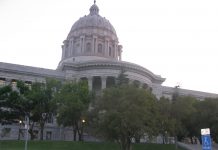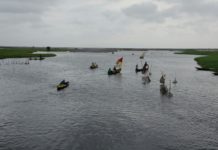Photo credit: DiasporaEngager (www.DiasporaEngager.com).
by LUKE ZUNGA
JOHANNESBURG, (CAJ News) – THE name ‘Economic Freedom Fighters’ (EFF) is catchy, because it talks to the economic concerns of citizens, which is the biggest iceberg in South Africa.
It gives the impression that the EFF will solve the economic disparities, inequality, poverty and redistribute land to bring prosperity, good life, education, health, and so on, by fighting the imperialists.
At its formation in 2013, there was so much hope that its leader Julius Malema’s fame rocketed as the youth – at least a large number of them – and suffering missing middle, including students, found refuge in the party.
It registered 6.35% in its infancy in the 2014 general elections, which rose to 10.8% in the 2019 polls. Its core campaign message was land redistribution, empowering the marginalized communities, quality education and health, and nationalization of key industries for wealth redistribution, among other priority areas.
The drop in electoral votes to 9.52% in 2024, despite packed stadiums during campaign rallies, painted something of a revolt by the electorate at the polls.
The recent departure of deputy president Floyd Shivambu, a graduate economist, seen by many as the real engine room of the party, raised eyebrows.
Why did he ditch the red overalls and barrettes for military fatigues and suits of former president Jacob Zuma-led uMkhonto weSizwe Party (MK Party)?
Did Shivambu accept that the EFF is largely rejected now? Did he recognize that the EFF’s antics in parliament and its dress code were puerile, and that the EFF would in all likelihood not ascend to power?
Only he knows exactly why, but hints do exist why he may have taken that route.
Many political parties in Africa used land redistribution to woo voters. In Zimbabwe, for example, the gamble of land redistribution worked to keep the Zimbabwe African National Union – Patriotic Front (Zanu-PF) in power, but the reality is that it was a failed policy, as it would become evident later.
In Zimbabwe land was vital to allow expansion of rural areas which were crowded, but it didn’t follow a clear economic programme or plan, but instead it was a free-for-all as farms owned by whites were invaded willy nilly.
As it turned out, Zimbabwe never managed to feed itself, or recover the jobs lost in the farming industry during the invasion of farms
The correct land policy is to take or acquire land for a clear and attainable programme, which South Africa and the rest of the continent, doesn’t necessarily seem to have in place.
As a result, land lost its securitization value. South Africa is waiting to see how the new Minister of Rural Development and Land Reform, Mzwanele Nyhontso of the Pan African Congress (PAC), will redistribute land given that it was one of his party’s main campaign priorities ahead of the May 29 elections.
It is a complex topic for this space. Britain, the European Union (EU), America, among others, did not distribute land in a haphazard manner. They kept it and only used it for specific programmes or projects to maintain its value, rather than dolling it out to everyone who may have needed it.
There is not enough land for everyone. Further, 63% of South Africans are urbanized. They want land to build houses. They know that small-farm holdings life is not viable, unless it is operating within a defined programme.
The EFF land strategy lacks clarity on the economy. It joins the bandwagon of just bashing the African National Congress (ANC)’s shortcomings.
EFF thinks that it should be in power first, then find the ideas. That, seemingly, is the same articulation from Zuma and his MK Party.
So how will the EFF implement its ideas? If Shivambu left the EFF to search for solutions, he must be lauded.
He must have realized that the EFF had not articulated any economic solution and was entering a cachectic zone.
Joining the MK Party could build a new, broader and stronger opposition in search of meaningful solutions to the many challenges South Africa faces.
For all we know, Shivambu might have the pulling effect to woo some influantial EFF members into the MK Party and consolidate his opposition.
Shivambu did not run away from Malema, for sure, as some might suggest, but he looked at the future of politics in South Africa.
If the Mk Party has no economic programme, outside of just claiming land, this and that, it will also fail. To design an economic programme is tricky.
The politics of South Africa is polarized, with so many parties contesting the space. There are over 300 parties fighting for a piece of the cake.
Unbeknown to many, there are ‘secret’ players behind the scenes, financing political parties for various reasons.
Of note are the rich oligarchies in South Africa. There are white secretive organizations who manoeuvre to destroy parties they don’t like, and fund new ones for their hidden agendas.
They approach people and hold meetings at coffee shops and shopping centres, and you will not know their true names as they use fake names.
Some may actually be from outside the country.
The MK Party, meanwhile, revealed that discussions with Shivambu started in November 2023.
The possibility is that this was an agent’s operation, and his departure from the EFF may have been part of the underground funded political strategy.
Shivambu would have been guaranteed some income to leave his party and parliamentary salary to be an ordinary member of the MK Party. He was later appointed national organiser of the party.
Who secured his salary in the meantime and who financed the MK Party electoral offensive?
There is no free money. In all cases where agents operate, they want guarantees, some promise of something in the new set up.
If the secretive organisations want the EFF out and grow the MK Party into government, we may be in for a shock. It is up to the voters of South Africa though to understand whether the MK Party can deliver on the economic front.
Parties banking on land redistribution, as is the case with the ANC, PAC, MK Party and EFF, seem to have no clue how to go about it effectively.
The only twist for the MK Party is that Zuma is an intelligence operative, and he seems the only one who can remove the tired liberation politics of the ANC and take his party to the top.
The EFF will continue as a shadow movement. There are certain interests who want the EFF to pull down the strength of the ruling ANC.
The MK Party can possibly overtake the ANC, if the Government of National Unity fails to deliver.
NOTE: The views expressed in this opinion piece are those of the author, Luke Zunga, and not those of CAJ News Africa.
– CAJ News
Source of original article: National – CAJ News Africa (www.cajnewsafrica.com).
The content of this article does not necessarily reflect the views or opinion of Global Diaspora News (www.GlobalDiasporaNews.com).
To submit your press release: (https://www.GlobalDiasporaNews.com/pr).
To advertise on Global Diaspora News: (www.GlobalDiasporaNews.com/ads).
Sign up to Global Diaspora News newsletter (https://www.GlobalDiasporaNews.com/newsletter/) to start receiving updates and opportunities directly in your email inbox for free.




























